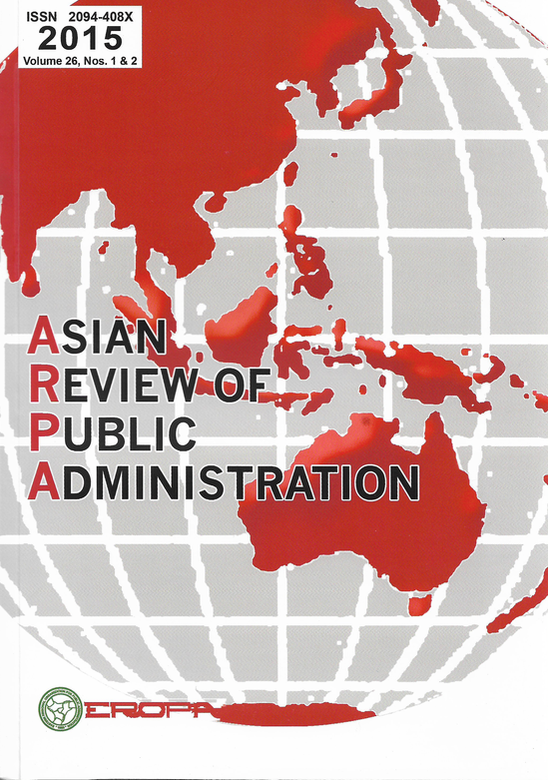Appraising the Risks of Public-Private Partnership: The Pasay City Manila Bay Reclamation Project30/6/2017 Severo C. Madrona, Jr.
De La Salle University Manila Public-Private Partnership (PPP) originates from the financial needs of the public sector to provide public goods or services at a high quality level embodying optimal risk allocation between the parties; that is, minimizing cost while realizing project developmental objectives. Asia-Pacific countries have undertaken PPPs to correct the shortfall in investment in infrastructure, which remains an expensive and complex undertaking both in its construction and upkeep. However, PPP projects involve more risks than other traditional procurement because of their complexities. This article appraises the viability of a PPP project undertaken by Pasay City, a highly-urbanized local government unit in Metro Manila. It addresses two questions: (a) why did the City Government of Pasay decide to undertake a reclamation project (costs-benefits of reclamation project) and (b) why did the City Government of Pasay pursue a PPP arrangement in this project? Also, this article contributes to the growing literature on PPPs in the Philippines and the wider Asia-Pacific region.
0 Comments
Leave a Reply. |
ARPA 2015
|
- Home
- About
-
Publications
- Public Administration News
-
ARPA
>
- ARPA Scope and Objectives
- ARPA Editorial Board
- ARPA Call for Papers
- Submit Article
-
ARPA Open Access
>
- India (2020-2023, Vol. 31, Nos. 1&2, pg. 4-22)
- Nepal (2020-2023, Vol. 31, Nos. 1&2, pg. 23-46)
- Vietnam (2020-2023, Vol. 31, Nos. 1&2, pg. 47-67)
- China (2020-2023, Vol. 31, Nos. 1&2, pg. 68-79)
- South Korea (2020-2023, Vol. 31, Nos. 1&2, pg. 80-99)
- Bangladesh (2020-2023, Vol. 31, Nos. 1&2, pg. 100-119)
- USA (2020-2023, Vol. 31, Nos. 1&2, pg. 120-141)
- Abstracts >
- Publication Ethics and Malpractice Statement
- Notes for Contributors
- Journal Indexing
- EROPA Bulletin >
- Resources >
- Membership
-
Conferences
-
Activities
- #TAG Dialogue
- Contact Us
- Home
- About
-
Publications
- Public Administration News
-
ARPA
>
- ARPA Scope and Objectives
- ARPA Editorial Board
- ARPA Call for Papers
- Submit Article
-
ARPA Open Access
>
- India (2020-2023, Vol. 31, Nos. 1&2, pg. 4-22)
- Nepal (2020-2023, Vol. 31, Nos. 1&2, pg. 23-46)
- Vietnam (2020-2023, Vol. 31, Nos. 1&2, pg. 47-67)
- China (2020-2023, Vol. 31, Nos. 1&2, pg. 68-79)
- South Korea (2020-2023, Vol. 31, Nos. 1&2, pg. 80-99)
- Bangladesh (2020-2023, Vol. 31, Nos. 1&2, pg. 100-119)
- USA (2020-2023, Vol. 31, Nos. 1&2, pg. 120-141)
- Abstracts >
- Publication Ethics and Malpractice Statement
- Notes for Contributors
- Journal Indexing
- EROPA Bulletin >
- Resources >
- Membership
-
Conferences
-
Activities
- #TAG Dialogue
- Contact Us


 RSS Feed
RSS Feed